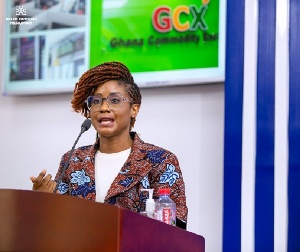The Chief Executive Officer (CEO)-Ghana Commodity Exchange and Convener-AfCFTA Association of Commodities Exchanges (A-ACX), Tucci Ivowi, has empasised that the vast opportunities presented by the association will allow exporting countries to share their surpluses with those in need – creating a win-win situation for all.
While citing food commodities such as maize, rice, sesame, sorghum, soybeans and many others as key agricultural commodities that African countries can exchange with one another by leveraging the association’s platform, she noted that by improving quality infrastructure such as storage conditions, transport links, communication networks, seamless end to end trading platforms and interlinking across countries, the continent’s farmers and traders can be empowered to access domestic and international markets – a step that she noted is vital to bridging the trade gap in food.
She further noted that as food insecurity in Africa continues to increase – due to crises stemming from climate change to global supply chain challenges – there is a need for the continent to increase its quality food production.
She said this during the memorandum of understanding (MoU) signing at the Intra-Africa Trade Fair 2023 held in Cairo, Egypt, to establish the A-ACX.
Signed by 16 leading commodities exchanges across Africa, the MoU among other things seeks to strengthen the continent’s existing commodity exchanges while promoting intra-African trade in commodities; hence fostering collaboration and collectively addressing challenges in the industry.
Referring to data from the International Trade Centre (2021), she revealed the immensity of untapped potential for intra-African trade: saying the continent has vast opportunity in metals, valued at around US$5.5billion and food products at approximately US$3.8billion.
“This potential provides a roadmap for African Commodity Exchanges within the AfCFTA Guided Trade Initiative,” she said.
While intimating that the A-ACX initiative has potential to attract foreign investors – leading to economic growth and infrastructure development across the continent, she said it will also extend access to financial services and credit for smallholder farmers and producers; allowing them to invest in their businesses and enhance their productivity.
“Under the Guided Trade Initiative, our commodity exchanges will work together to identify priority commodities and countries and use our platform to start by trading a few of them. With the benefits such an association brings, we believe we can tackle the barriers and demonstrate in a small way that this can be done,” she also said.
Mrs. Ivowi however bemoaned the lack of well-developed commodity exchange systems in some Africa nations, but commended the progress made by others in that regard.
Delving into the World Bank’s world development indicators, she stated that on average between 2017-2019 over 13 percent of Africa’s import spending was devoted to food and agricultural commodities – adding that in some countries, like Benin and Comoros, food represents more than 40 percent of imports compared to less than 10 percent in Congo DRC, South Africa, Tanzania and Zambia.
She admitted that the association requires broader collaborative support to foster significant growth, and urged private sector to contribute by participating actively, fostering liquidity and innovating new financial products.
Commodity Exchanges are marketplaces where licenced buyers and sellers engage in trading commodity-linked contracts based on set rules and procedures.










